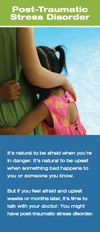
An easy-to-read booklet on Post-Traumatic Stress Disorder (PTSD) that explains what it is, when it starts, how long it lasts, and how to get help.
Introduction
It's natural to be afraid when you're in danger. It's natural to be upset when something bad happens to you or someone you know. But if you feel afraid and upset weeks or months later, it's time to talk with your doctor. You might have post-traumatic stress disorder.
What is post-traumatic stress disorder, or PTSD?
PTSD is a real illness. You can get PTSD after living through or seeing a dangerous event, such as war, a hurricane, or bad accident. PTSD makes you feel stressed and afraid after the danger is over. It affects your life and the people around you.
If you have PTSD, you can get treatment and feel better.
Who gets PTSD?
PTSD can happen to anyone at any age. Children get PTSD too.
You don't have to be physically hurt to get PTSD. You can get it after you see other people, such as a friend or family member, get hurt.
What causes PTSD?
Living through or seeing something that's upsetting and dangerous can cause PTSD. This can include:
- Being a victim of or seeing violence
- The death or serious illness of a loved one
- War or combat
- Car accidents and plane crashes
- Hurricanes, tornadoes, and fires
- Violent crimes, like a robbery or shooting.
There are many other things that can cause PTSD. Talk to your doctor if you are troubled by something that happened to you or someone you care about.
How do I know if I have PTSD?
Your doctor can help you find out. Call your doctor if you have any of these problems:
- Bad dreams
- Flashbacks, or feeling like the scary event is happening again
- Scary thoughts you can't control
- Staying away from places and things that remind you of what happened
- Feeling worried, guilty, or sad
- Feeling alone
- Trouble sleeping
- Feeling on edge
- Angry outbursts
- Thoughts of hurting yourself or others.
Children who have PTSD may show other types of problems. These can include:
- Behaving like they did when they were younger
- Being unable to talk
- Complaining of stomach problems or headaches a lot
- Refusing to go places or play with friends.
When does PTSD start?
PTSD starts at different times for different people. Signs of PTSD may start soon after a frightening event and then continue. Other people develop new or more severe signs months or even years later.
How can I get better?
PTSD can be treated. A doctor or mental health professional who has experience in treating people with PTSD can help you. Treatment may include "talk" therapy, medication, or both.
Treatment might take 6 to 12 weeks. For some people, it takes longer. Treatment is not the same for everyone. What works for you might not work for someone else.
Drinking alcohol or using other drugs will not help PTSD go away and may even make it worse.
How PTSD Can Happen: Janet's Story
Janet was in a car crash last year. The crash was frightening, and a man in another car died. Janet thought she was lucky. She lived through it and she wasn't badly hurt.
Janet felt fine for a while, but things changed. She started to have nightmares every night. And when she was awake, she could see the crash happening over and over in her mind. She felt tense every time she rode in a car, and tried to avoid it as much as she could. Janet started yelling at her husband over little things. And sometimes she just felt numb inside.
Janet's husband asked her to see her doctor, who told her she might have PTSD. Janet's doctor put her in touch with a doctor trained to help people with PTSD. Soon Janet was being treated. It helped her to feel less tense and scared, and it helped her to sleep. It also helped her to share her feelings with the doctor. It wasn't easy, but after a couple of months Janet began to feel better.
Facts About PTSD
- PTSD can affect anyone at any age.
- Millions of Americans get PTSD every year.
- Many war veterans have had PTSD.
- Women tend to get PTSD more often than men.
- PTSD can be treated. You can feel better.
Don't Hurt Yourself
- You are not alone. Get help if you are thinking about hurting yourself.
- Call your doctor.
- Call 911 if you need help right away.
- Talk to a trained counselor at the National Suicide Prevention Lifeline at 1-800-273-TALK (8255); TTY: 1-800-799-4TTY (4889).
For More Information
Contact us to find out more about PTSD.
National Institute of Mental Health
Science Writing, Press & Dissemination Branch
6001 Executive Boulevard
Room 8184, MSC 9663
Bethesda, MD 20892-9663
Phone: 301-443-4513 or
1-866-615-NIMH (6464) toll-free
TTY: 301-443-8431 or
1-866-415-8051 toll-free
E-mail: nimhinfo@nih.gov
Web site: www.nimh.nih.gov
U.S. DEPARTMENT OF HEALTH AND HUMAN SERVICES
National Institutes of Health
NIH Publication No. TR-08-6388
Related Information
- See all NIMH publications about:
- Browse Mental Health Topics
- About NIMH Publications





